Quick Reference

 | February 12, 1809 Lincoln is born in Hardin County, Kentucky |
 | 1816 Lincoln family moves from Kentucky to Indiana. Land is available for direct purchase, and slavery is prohibited. |
 | March 4, 1861 Lincoln is Inaugurated 16th President of the United States, despite not even being on the ballot in nine of the states in the South because of his opposition to slavery. |
 | April 12, 1861 Confederate forces fire at Fort Sumter just as Federal reinforcements arrive. This starts the Civil War. |
 | January 1, 1863 Lincoln issues the Emancipation Proclamation, Freeing Southern Slaves |
 | November 19, 1863 Lincoln delives the Gettysburg address at a dedication ceremony for the National Cemetery at Gettysburg |
 | April 14, 1865 Lincoln was assassinated at Ford's Theatre in Washington by John Wilkes Booth at age 56 |
|
| |
Biography of Abraham Lincoln

Lincoln warned the South in his Inaugural Address: "In your hands, my dissatisfied fellow countrymen, and not in mine, is the momentous issue of civil war. The government will not assail you.... You have no oath registered in Heaven to destroy the government, while I shall have the most solemn one to preserve, protect and defend it."
Lincoln thought secession illegal, and was willing to use force to defend Federal law and the Union. When Confederate batteries fired on Fort Sumter and forced its surrender, he called on the states for 75,000 volunteers. Four more slave states joined the Confederacy but four remained within the Union. The Civil War had begun.
The son of a Kentucky frontiersman, Lincoln had to struggle for a living and for learning. Five months before receiving his party's nomination for President, he sketched his life:
"I was born Feb. 12, 1809, in Hardin County, Kentucky. My parents were both born in Virginia, of undistinguished families--second families, perhaps I should say. My mother, who died in my tenth year, was of a family of the name of Hanks.... My father ... removed from Kentucky to ... Indiana, in my eighth year.... It was a wild region, with many bears and other wild animals still in the woods. There I grew up.... Of course when I came of age I did not know much. Still somehow, I could read, write, and cipher ... but that was all."
Lincoln made extraordinary efforts to attain knowledge while working on a farm, splitting rails for fences, and keeping store at New Salem, Illinois. He was a captain in the Black Hawk War, spent eight years in the Illinois legislature, and rode the circuit of courts for many years. His law partner said of him, "His ambition was a little engine that knew no rest."
He married Mary Todd, and they had four boys, only one of whom lived to maturity. In 1858 Lincoln ran against Stephen A. Douglas for Senator. He lost the election, but in debating with Douglas he gained a national reputation that won him the Republican nomination for President in 1860.
As President, he built the Republican Party into a strong national organization. Further, he rallied most of the northern Democrats to the Union cause. On January 1, 1863, he issued the Emancipation Proclamation that declared forever free those slaves within the Confederacy.
Lincoln never let the world forget that the Civil War involved an even larger issue. This he stated most movingly in dedicating the military cemetery at Gettysburg: "that we here highly resolve that these dead shall not have died in vain--that this nation, under God, shall have a new birth of freedom--and that government of the people, by the people, for the people, shall not perish from the earth."
Lincoln won re-election in 1864, as Union military triumphs heralded an end to the war. In his planning for peace, the President was flexible and generous, encouraging Southerners to lay down their arms and join speedily in reunion.
The spirit that guided him was clearly that of his Second Inaugural Address, now inscribed on one wall of the Lincoln Memorial in Washington, D. C.: "With malice toward none; with charity for all; with firmness in the right, as God gives us to see the right, let us strive on to finish the work we are in; to bind up the nation's wounds.... "
On Good Friday, April 14, 1865, Lincoln was assassinated at Ford's Theatre in Washington by John Wilkes Booth, an actor, who somehow thought he was helping the South. The opposite was the result, for with Lincoln's death, the possibility of peace with magnanimity died.
As a leader, Lincoln was simple direct and compassionate. His attitude is probably best expressed in his own words, "Die when I may, I want it said by those who knew me best that I always plucked a thistle and planted a flower where I thought a flower would grow."
|
| |
Stories About Abraham Lincoln

 Don't Aim Too High Don't Aim Too High
"Billy, don't shoot too high--aim lower, and the common people will understand you," Lincoln once said to a brother lawyer.
"They are the ones you want to reach--at least, they are the ones you ought to reach.
"The educated and refined people will understand you, anyway. If you aim too high, your idea will go over the heads of the masses, and only hit those who need no hitting."
* * *
 Lincoln's Last Written Words Lincoln's Last Written Words
As the President and Mrs. Lincoln were leaving the White House, a few minutes before eight o'clock, on the evening of April 14th, 1865, Lincoln wrote this note:
"Allow Mr. Ashmun and friend to come to see me at 9 o'clock a. m., to-morrow, April 15th, 1865."
* * *
 Lincoln's Last Official Act Lincoln's Last Official Act
Probably the last official act of President Lincoln's life was the signing of the commission reappointing Alvin Saunders Governor of Nebraska.
"I saw Mr. Lincoln regarding the matter," said Governor Saunders, "and he told me to go home; that he would attend to it all right. I left Washington on the morning of the 14th, and while en route the news of the assassination on the evening of the same day reached me. I immediately wired back to find out what had become of my commission, and was told that the room had not been opened. When it was opened, the document was found lying on the desk.
"Mr. Lincoln signed it just before leaving for the theater that fatal evening, and left it lying there, unfolded.
"A note was found below the document as follows: 'Rather a lengthy commission, bestowing upon Mr. Alvin Saunders the official authority of Governor of the Territory of Nebraska.' Then came Lincoln's signature, which, with one exception, that of a penciled message on the back of a card sent up by a friend as Mr. Lincoln was dressing for the theater, was the very last signature of the martyred President."
* * *
 President Lincoln's Last Public Address President Lincoln's Last Public Address
The President made his last public address on the evening of April 11th, 1865, to a gathering at the White House. Said he
"We meet this evening not in sorrow, but in gladness of heart.
"The evacuation of Petersburg and Richmond, and the surrender of the principal insurgent army, give hope of a righteous and speedy peace, whose joyous expression cannot be restrained.
"In the midst of this, however, He from whom all blessings flow must not be forgotten.
"Nor must those whose harder part gives us the cause of rejoicing be overlooked; their honors must not be parceled out with others.
"I myself was near the front, and had the high pleasure of transmitting the good news to you; but no part of the honor, for plan or execution, is mine.
"To General Grant, his skillful officers and brave men, all belongs."
* * *
 Lincoln's Ideas On Crossing a River When He Got to It Lincoln's Ideas On Crossing a River When He Got to It
Lincoln's reply to a Springfield (Illinois) clergyman, who asked him what was to be his policy on the slavery question was most apt:
"Well, your question is rather a cool one, but I will answer it by telling you a story:
"You know Father B., the old Methodist preacher? and you know Fox River and its freshets?
"Well, once in the presence of Father B., a young Methodist was worrying about Fox River, and expressing fears that he should be prevented from fulfilling some of his appointments by a freshet in the river.
"Father B. checked him in his gravest manner. Said he:
"'Young man, I have always made it a rule in my life not to cross Fox River till I get to it.'
"And," said the President, "I am not going to worry myself over the slavery question till I get to it."
A few days afterward a Methodist minister called on the President, and on being presented to him, said, simply:
"Mr. President, I have come to tell you that I think we have got to Fox River!"
Lincoln thanked the clergyman, and laughed heartily.
* * *
 No False Pride in Lincoln No False Pride in Lincoln
General McClellan had little or no conception of the greatness of Abraham Lincoln. As time went on, he began to show plainly his contempt of the President, frequently allowing him to wait in the ante-room of his house while he transacted business with others. This discourtesy was so open that McClellan's staff noticed it, and newspaper correspondents commented on it. The President was too keen not to see the situation, but he was strong enough to ignore it. It was a battle he wanted from McClellan, not deference.
"I will hold McClellan's horse, if he will only bring us success," he said one day.
* * *
 No Vices, No Virtues No Vices, No Virtues
Lincoln always took great pleasure in relating this yarn:
Riding at one time in a stage with an old Kentuckian who was returning from Missouri, Lincoln excited the old gentleman's surprise by refusing to accept either of tobacco or French brandy.
When they separated that afternoon--the Kentuckian to take another stage bound for Louisville--he shook hands warmly with Lincoln, and said, good-humoredly:
"See here, stranger, you're a clever but strange companion. I may never see you again, and I don't want to offend you, but I want to say this: My experience has taught me that a man who has no vices has d--d few virtues. Good-day."
* * *
 Not As Smooth As He Looked Not As Smooth As He Looked
Mr. Lincoln's skill in parrying troublesome questions was wonderful. Once he received a call from Congressman John Ganson, of Buffalo, one of the ablest lawyers in New York, who, although a Democrat, supported all of Mr. Lincoln's war measures. Mr. Ganson wanted explanations. Mr. Ganson was very bald with a perfectly smooth face. He had a most direct and aggressive way of stating his views or of demanding what he thought he was entitled to. He said: "Mr. Lincoln, I have supported all of your measures and think I am entitled to your confidence. We are voting and acting in the dark in Congress, and I demand to know--think I have the right to ask and to know--what is the present situation, and what are the prospects and conditions of the several campaigns and armies."
Mr. Lincoln looked at him critically for a moment and then said: "Ganson, how clean you shave!"
Most men would have been offended, but Ganson was too broad and intelligent a man not to see the point and retire at once, satisfied, from the field.
* * *
 One Man Isn't Missed One Man Isn't Missed
Salmon P. Chase, when Secretary of the Treasury, had a disagreement with other members of the Cabinet, and resigned.
The President was urged not to accept it, as "Secretary Chase is to-day a national necessity," his advisers said.
"How mistaken you are!" Lincoln quietly observed. "Yet it is not strange; I used to have similar notions. No! If we should all be turned out to-morrow, and could come back here in a week, we should find our places filled by a lot of fellows doing just as well as we did, and in many instances better.
"Now, this reminds me of what the Irishman said. His verdict was that 'in this country one man is as good as another; and, for the matter of that, very often a great deal better.' No; this Government does not depend upon the life of any man."
* * *
 The Cabinet Lincoln Wanted The Cabinet Lincoln Wanted
Judge Joseph Gillespie, of Chicago, was a firm friend of Mr. Lincoln, and went to Springfield to see him shortly before his departure for the inauguration.
"It was," said judge Gillespie, "Lincoln's Gethsemane. He feared he was not the man for the great position and the great events which confronted him. Untried in national affairs, unversed in international diplomacy, unacquainted with the men who were foremost in the politics of the nation, he groaned when he saw the inevitable War of the Rebellion coming on. It was in humility of spirit that he told me he believed that the American people had made a mistake in selecting him.
"In the course of our conversation he told me if he could select his cabinet from the old bar that had traveled the circuit with him in the early days, he believed he could avoid war or settle it without a battle, even after the fact of secession.
"'But, Mr. Lincoln,' said I, 'those old lawyers are all Democrats.'
"'I know it,' was his reply. 'But I would rather have Democrats whom I know than Republicans I don't know.'"
* * *
 Grant's Brand of Whiskey: Execution is Everything Grant's Brand of Whiskey: Execution is Everything
Lincoln was not a man of impulse, and did nothing upon the spur of the moment; action with him was the result of deliberation and study. He took nothing for granted; he judged men by their performances and not their speech.
If a general lost battles, Lincoln lost confidence in him; if a commander was successful, Lincoln put him where he would be of the most service to the country.
"Grant is a drunkard," asserted powerful and influential politicians to the President at the White House time after time; "he is not himself half the time; he can't be relied upon, and it is a shame to have such a man in command of an army."
"So Grant gets drunk, does he?" queried Lincoln, addressing himself to one of the particularly active detractors of the soldier, who, at that period, was inflicting heavy damage upon the Confederates.
"Yes, he does, and I can prove it," was the reply.
"Well," returned Lincoln, with the faintest suspicion of a twinkle in his eye, "you needn't waste your time getting proof; you just find out, to oblige me, what brand of whiskey Grant drinks, because I want to send a barrel of it to each one of my generals."
That ended the crusade against Grant, so far as the question of drinking was concerned.
* * *
 Couldn't Let Go of the Hog Couldn't Let Go of the Hog
When Governor Curtin of Pennsylvania described the terrible butchery at the battle of Fredericksburg, Mr. Lincoln was almost broken-hearted.
The Governor regretted that his description had so sadly affected the President. He remarked: "I would give all I possess to know how to rescue you from this terrible war." Then Mr. Lincoln's wonderful recuperative powers asserted themselves and this marvelous man was himself.
Lincoln's whole aspect suddenly changed, and he relieved his mind by telling a story.
"This reminds me, Governor," he said, "of an old farmer out in Illinois that I used to know.
"He took it into his head to go into hog-raising. He sent out to Europe and imported the finest breed of hogs he could buy.
"The prize hog was put in a pen, and the farmer's two mischievous boys, James and John, were told to be sure not to let it out. But James, the worst of the two, let the brute out the next day. The hog went straight for the boys, and drove John up a tree, then the hog went for the seat of James' trousers, and the only way the boy could save himself was by holding on to the hog's tail.
"The hog would not give up his hunt, nor the boy his hold! After they had made a good many circles around the tree, the boy's courage began to give out, and he shouted to his brother, 'I say, John, come down, quick, and help me let go of this hog!'
"Now, Governor, that is exactly my case. I wish some one would come and help me to let the hog go."
* * *
 Three Infernal Bores Three Infernal Bores
One day, when President Lincoln was alone and busily engaged on an important subject, involving vexation and anxiety, he was disturbed by the unwarranted intrusion of three men, who, without apology, proceeded to lay their claim before him.
The spokesman of the three reminded the President that they were the owners of some torpedo or other warlike invention which, if the government would only adopt it, would soon crush the rebellion.
"Now," said the spokesman, "we have been here to see you time and again; you have referred us to the Secretary of War, the Chief of Ordnance, and the General of the Army, and they give us no satisfaction. We have been kept here waiting, till money and patience are exhausted, and we now come to demand of you a final reply to our application."
Mr. Lincoln listened to this insolent tirade, and at its close the old twinkle came into his eye.
"You three gentlemen remind me of a story I once heard," said he, "of a poor little boy out West who had lost his mother. His father wanted to give him a religious education, and so placed him in the family of a clergyman, whom he directed to instruct the little fellow carefully in the Scriptures. Every day the boy had to commit to memory and recite one chapter of the Bible. Things proceeded smoothly until they reached that chapter which details the story of the trial of Shadrach, Meshach and Abednego in the fiery furnace. When asked to repeat these three names the boy said he had forgotten them.
"His teacher told him that he must learn them, and gave him another day to do so. The next day the boy again forgot them.
"'Now,' said the teacher, 'you have again failed to remember those names and you can go no farther until you have learned them. I will give you another day on this lesson, and if you don't repeat the names I will punish you.'
"A third time the boy came to recite, and got down to the stumbling block, when the clergyman said: 'Now tell me the names of the men in the fiery furnace.'
"'Oh,' said the boy, 'here come those three infernal bores! I wish the devil had them!'"
Having received their "final answer," the three patriots retired, and at the Cabinet meeting which followed, the President, in high good humor, related how he had dismissed his unwelcome visitors.
* * *
|
|
Abraham Lincoln and His Times

|
Lincoln's Life
|

|
Historical Events
|
| |
1800's

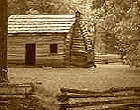
February 12, 1809 Lincoln is born in Hardin County, Kentucky. He was the first President to be born outside the 13 original colonies. |
|
 |
1800: On November 1, U.S. President John Adams is the first President to live in the White House, then known as the Executive Mansion and sixteen days later, the United States Congress holds its first session in Washington, D.C. 
1800: Count Alessandro Volta invents the battery.
1801: Thomas Jefferson is elected as the 3rd president of the United States on February 17
1803: On April 2, President Thomas Jefferson doubles the size of the United States of America with his purchase of the Louisiana Territory from Napoleon's France
1805: Lord Nelson defeats the French-Spanish fleets in the Battle of Trafalgar on October 21
 1809: On March 4, James Madison takes oath as 4th President of the United States.
1809: On March 4, James Madison takes oath as 4th President of the United States.

|
|
1810's
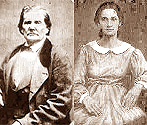

Fall 1816 The Lincoln family moves from Kentucky to Indiana. Land is available for direct purchase, and slavery is prohibited. Abraham Lincoln lived in Indiana for 14 years, from the age of 7 to the age of 21.
October 5, 1818 Abraham's mother, Nancy Lincoln, dies when he was 9 years old.
December 2, 1819 Thomas Lincoln, Abraham's father marries Sarah Bush Johnston. She has three children of her own first her first marriage. |
|
 |
1810: Peter Durand invents the tin can
 1812: The War of 1812 - the U.S. declars war on Great Britain for violating its maritime rights
1812: The War of 1812 - the U.S. declars war on Great Britain for violating its maritime rights
1814: George Stephenson designs the first steam locomotive
1814: Joseph Nicιphore Niιpce was the first person to take a photograph. He took the picture by setting up a machine called the camera obscura in the window of his home in France. It took eight hours for the camera to take the picture.
1814: Francis Scott Key writes new lyrics a well-known drinking song, To Anacreon in Heaven, as the The Star-Spangled Banner
 1815: Defeated at Waterloo, Napoleon goes into exile on St. Helena
1815: Defeated at Waterloo, Napoleon goes into exile on St. Helena
 1817: James Monroe became the 5th president of the U.S. on March 4
1817: James Monroe became the 5th president of the U.S. on March 4
1819: The U.S. aquires Florida from Spain

|
|
1820's
1824 Lincoln is taught by Azel Dorseyand creats a sum book creating the ditty: "Abraham Lincoln is my name. And with my pen I wrote the same. I wrote in both haste and speed and left it here for fools to read."
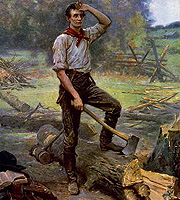
1827 Lincoln earns his first dollar ferrying passengers to steamboats traveling the Ohio River.
1829 Jerry Gentry, the richest man in the community, hires Lincoln to work in his store. |
|
 |
1820: Daniel Boone dies at age 85
1820: The Missouri Compromise is passed by Congress, admitting Missouri as a slave state and ignitng the slavery conflict
1821: Frenchman Jean-Franηois Champollion deciphers the Rosetta Stone, enabling scholars to read Egyptian hieroglyphics
 1825: John Quincy Adams became the 6th president of the U. S. on March 4
1825: John Quincy Adams became the 6th president of the U. S. on March 4
1825: The Erie Canal opns, stretching 363 miles to connect the Great Lakes and the Atlantic

1826: James Fenimore Cooper publishes The Last of the Mohicans
1826: Noah Webster publishes American Dictionary of the English Language
1829: American, W.A. Burt invents a typewriter
 1829: Andrew Jackson became the 7th president of the U.S. on March 4 and re-elected in 1832
1829: Andrew Jackson became the 7th president of the U.S. on March 4 and re-elected in 1832

|
|
1830's
1830 The Lincoln family moves to Illinois. They locate 10 miles southwest of Decatur on the north bank of the Sangamon River.
1831 Lincoln and two others are hired by Denton Offutt to take a flat boat to New Orleans. As a result, he is hired as a clerk in his store in New Salem, Illinois until the busness fails a few months later.
August 6, 1832 Lincoln, a candidate for the first time, is defeated in his bid for a seat in the Illinois legislature.
May 7, 1833 President Jackson appoints Lincoln as postmaster at New Salem.
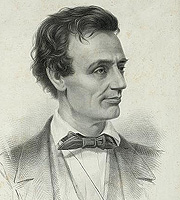
August 4, 1834 Lincoln runs again for the state legislature. He wins and goes on to serve four successive two-year terms.
September 9, 1836 Lincoln receives his license to practice law.
March 3, 1837 Lincoln makes his first speech against slavery.
April 15, 1837 Lincoln moves to Springfield, Illinois and becomes a junior partner in the law firm of John Stuart.
|
|
 |
1830: U.S. population is 12,866,020
1830: Scottish geologist Sir Charles Lyell publishes Principles of Geology, paving the way for evolutionary thinking
 1831: Charles Darwin joins a five year scientific expedition on the survey ship HMS Beagle
1831: Charles Darwin joins a five year scientific expedition on the survey ship HMS Beagle
1831: American, Cyrus McCormick invents the first commercially successful reaper
1832: The Oregon Trail becomes a main route for settlers
1833: The British Empire abolishes slavery

1835: Alexis de Tocqueville publishes Democracy in America in France (America in 1838)
1836: On February 23, the army of General Santa Anna arrives at the Alamo. The Texas volunteers hold the fort for 13 days before the Mexicans break through and slaughter most of the defenders
1836: Samuel Colt invented the first revolver
 1837: Martin Van Buren became the 8th president of the U.S. on March 4
1837: Martin Van Buren became the 8th president of the U.S. on March 4
1838: Samuel F.B. Morse creates the Morse Code

|
|
1840's
June 18, 1840 Lincoln argues his first case before the Illinois Supreme Court.
August to September 1840 Lincoln makes a speaking tour around Illinois for the presidential campaign.
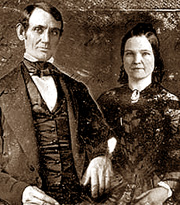
November 4, 1842 Mary Todd and Abraham Lincoln marry. They would have four children, although only their first-born son Robert would survive to adulthood.
August 1, 1843 Robert Todd Lincoln, his first son, is born.
March 10, 1846 Edward Baker Lincoln, his second son, is born.
December 6, 1847 Lincoln takes his seat in congress.
March 4, 1849 Lincoln's term ends. He returns to Springfield to practice law.
|
|

|
 1841: William Henry Harrison became the 9th president of the U.S. on March 4 and the first president to die in office just one month later
1841: William Henry Harrison became the 9th president of the U.S. on March 4 and the first president to die in office just one month later
1841: Ralph Waldo Emerson published Essays, First Series (including "Self-Reliance")
1841: John Tyler became the 10th president of the U.S. on April 4

1845: The Irish potato famine begins
 1845: John Polk becomes the 11th president of the U.S. on April 4
1845: John Polk becomes the 11th president of the U.S. on April 4
1846-48: The Mexican War results in the U.S. claiming much of California and the Southwest
1847: The first U.S. postal stamps are issued
1847: Hungarian, Ignaz Semmelweis invents antisceptics


1849: The California Gold Rush begins
 1849: Zachary Taylor became the 12th president of the U.S. on April 4 and dies just 16 months into his term
1849: Zachary Taylor became the 12th president of the U.S. on April 4 and dies just 16 months into his term

|
|
1850's
February 1, 1850 His son Edward dies after a two month illness.
December 21, 1850 William Wallace Lincoln, his third son, is born.
January 17, 1851 Thomas Lincoln, Abraham's father, dies.
April 4, 1853 Thomas (Tad) Lincoln, his fourth son, is born.
November 7, 1854 Lincoln is elected to state legislature but resigns to run for a senate seat and is defeated.

June 26, 1857 Lincoln speaks against the Dred Scott decision.
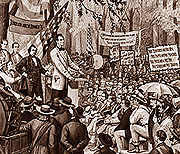
June 16, 1858 Lincoln, now a Republican, is nominated to run against Stephen Douglas for a senate seat. He challenges Douglas to a series of debates. October 18th the last debate takes place. He loses the election but the debates make him a national figure.
|
|

|
1850: Beginning of the Taiping Rebellion, China's - and the world's - bloodiest civil war to date
 1850: Millard Fillmore became the 13th president of the U.S. on July 9
1850: Millard Fillmore became the 13th president of the U.S. on July 9
1851: The Great Exhibition, the world's first industrial fair opens in London's Crystal Palace
1852: Harriet Beecher Stowe publishes Uncle Tom's Cabin(Sells one million copies within the year)
1853: Franklin Pierce becomes 14th president of the U.S. on April 4
1854: Henry David Thoreau publishes Walden
1855: Walt Whitman publishes Leaves of Grass
1854-56: Russia is defeated by Germany and France in the Crimean War
1856: Louis Pasteur invents pasteurisation
 1857: James Buchanan becomes the 15th president of the U.S. on March 4
1857: James Buchanan becomes the 15th president of the U.S. on March 4

1857: The Atlantic Monthly begins publication

1859 Charles Darwin publishes On the Origin of Species by Means of Natural Selection

|
|
1860's
May 16, 1860 Lincoln is nominated by the Repubican Party for president.
March 4, 1861 Lincoln becomes the 16th President of the United States
February 20, 1862 His son Willie dies.

January 1, 1863 Lincoln issues the Emancipation Proclamation, Freeing Southern Slaves
November 19, 1863 Lincoln delives the Gettysburg address at a dedication ceremony for the National Cemetery at Gettysburg
March 4, 1865 Lincoln delivers his Second Inaugural Address.
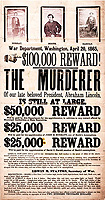
April 14, 1865 Lincoln was assassinated at Ford's Theatre in Washington by John Wilkes Booth
April 15, 1865 Lincoln dies (age 56) at the Petersen House, Washington, D.C.
|
|
 |
1860: U.S. population is 31,443,321
 1861: Confederate forces fire at Fort Sumter on April 12, just as Federal reinforcements arrive. This starts the Civil War.
1861: Confederate forces fire at Fort Sumter on April 12, just as Federal reinforcements arrive. This starts the Civil War.
1861: Matthew Brady organizes a team of 20 photographers to document the Civil War
1862: Victor Hugo publishes Les Misιrables
1862: French humanitarian Jean-Henri Dunant founds the Red Cross
1862: French astronomers develop a spectroscope to examine light emitted from stars and learn that stars are formed from the same elements as sun and Earth
1862: Richard Gatling patents the machine gun
 1863: Confederate general Thomas "Stonewall" Jackson dies on May 10
1863: Confederate general Thomas "Stonewall" Jackson dies on May 10
1863: When Johnny Comes Marching Home, a Civil War ballad is written by Thomas Bishop
1865: Grant accepts Lee's surrender at Appomattox on April 9. Most perople view this as the end of the war,  although serveral additional battles occur before the South officially surrenders although serveral additional battles occur before the South officially surrenders
1865: Vice-president Andrew Johnson becomes the 17th President of the United States on April 15, 1865
 1865: Mark Twain pens The Celebrated Jumping Frog of Calaveras County
1865: Mark Twain pens The Celebrated Jumping Frog of Calaveras County
1865: Lewis Carroll publishes his classic book Alice's Adventures in Wonderland
1866: Alfred Nobel invents dynamite
1868: Fourteenth Amendment grants full citizenship to all (including African Americans) born in the US except Native Americans

|
|
| | |
Quotes About Lincoln

 "If there is not the war, you don't get the great general. If ther is not a great occasion, you don't get a great statesman. If Lincoln had lived in a time of peace, no one would have known his name." "If there is not the war, you don't get the great general. If ther is not a great occasion, you don't get a great statesman. If Lincoln had lived in a time of peace, no one would have known his name."
Theodore Roosevelt, 26th President of the United States
 "Abraham Lincoln had a moral elevation most rare in a statesman, or indeed in any man." "Abraham Lincoln had a moral elevation most rare in a statesman, or indeed in any man."
William Gladstone, British statesman
 "There lies the most perfect ruler of men the world has ever seen. Now he belongs to the ages." "There lies the most perfect ruler of men the world has ever seen. Now he belongs to the ages."
Edwin M. Stanton, at Lincoln's death (15 April 1865). Stanton had originally opposed Lincoln, dubbing him "The Original Gorilla" because of his looks and frontier speech, but eventually grew to admire him.
 "Of all the great men I have met, he seemed to possess more of the elements of greatness, combined with goodness, than any other." "Of all the great men I have met, he seemed to possess more of the elements of greatness, combined with goodness, than any other."
General William Sherman
|
| |
The Speeches of Abraham Lincoln
 Concluding Remarks from the Annual Message to Congress: December 1, 1862 in Washington D.C. Concluding Remarks from the Annual Message to Congress: December 1, 1862 in Washington D.C.
 Second Inaugural Address: March 4, 1865 Lincoln thought this speech was his best. He meant it as a blueprint for tolerance to serve as a guide in the days to come. Frederick Douglas, who Lincoln saw in the audience that day, told Lincoln that it was "a sacred effort." Second Inaugural Address: March 4, 1865 Lincoln thought this speech was his best. He meant it as a blueprint for tolerance to serve as a guide in the days to come. Frederick Douglas, who Lincoln saw in the audience that day, told Lincoln that it was "a sacred effort."
 The Gettysburg Address: November 19, 1863 at Gettysburg, Pennsylvania The text is from the so-called "Bliss Copy," one of several versions which Lincoln wrote, and believed to be the final version. The Gettysburg Address: November 19, 1863 at Gettysburg, Pennsylvania The text is from the so-called "Bliss Copy," one of several versions which Lincoln wrote, and believed to be the final version.
 Lyceum Address: January 27, 1838, The Perpetuation of Our Political Institutions Address Before the Young Men's Lyceum of Springfield, Illinois Lyceum Address: January 27, 1838, The Perpetuation of Our Political Institutions Address Before the Young Men's Lyceum of Springfield, Illinois

|
| |
Books About Abraham Lincoln

 Lincoln on Leadership: Executive Strategies for Tough Times Lincoln on Leadership: Executive Strategies for Tough Times
 by Donald T. Phillips by Donald T. Phillips
 Team of Rivals: The Political Genius of Abraham Lincoln Team of Rivals: The Political Genius of Abraham Lincoln
 by Doris Kearns Goodwin by Doris Kearns Goodwin
 Lincoln's Virtues: An Ethical Biography by William Lee Miller Lincoln's Virtues: An Ethical Biography by William Lee Miller
 President Lincoln: The Duty of a Statesman by William Lee Miller President Lincoln: The Duty of a Statesman by William Lee Miller
 Lincoln Speaks to Leaders: 20 Powerful Lessons for Today's Leaders from Lincoln Speaks to Leaders: 20 Powerful Lessons for Today's Leaders from
 America's 16th President by Gene Griessman and Pat Williams America's 16th President by Gene Griessman and Pat Williams





 A. Lincoln: A Biography by Ronald C. White Jr. A. Lincoln: A Biography by Ronald C. White Jr.
 Looking for Lincoln: The Making of an American Icon by Peter W. Kunhardt, Looking for Lincoln: The Making of an American Icon by Peter W. Kunhardt,
 Philip B. Kunhardt III and Peter W. Kunhardt Jr. Philip B. Kunhardt III and Peter W. Kunhardt Jr.
 Abraham Lincoln's Extraordinary Era: The Man and His Times by Karen Kostyal Abraham Lincoln's Extraordinary Era: The Man and His Times by Karen Kostyal
 Tried by War: Abraham Lincoln as Commander in Chief by James M. McPherson Tried by War: Abraham Lincoln as Commander in Chief by James M. McPherson

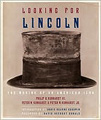
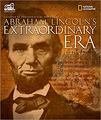

|
|



















